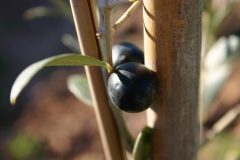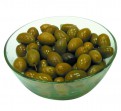Attractions
Greek olives

Olives are the fruit of the olive tree and are used to produce a very high quality olive oil, as well as being eaten on their own and used in various dishes. The excellent properties of olives and olive oil were used by the ancient Greeks and Greek olives are rightly considered to be among the best quality. Green and dark olives are the best known - they are the same species, only green olives are the unripe form of dark olives.
According to scientists, olives have a very positive effect on the human body. Thanks to their detoxifying effects, they play a major role in the fight against ageing, civilisation and heart disease, and olive oil can help in the treatment of many skin diseases. They improve digestion and appetite. Olives contain vitamins K, A, E and D, which promote the patency of blood vessels. They contain large amounts of antioxidants that prevent the activity of unhealthy free radicals in your body. Although olives are very fatty, they still support the weight loss process - both black and green olives are very low in calories. At the same time, they provide the body with the necessary energy and fill you up quickly.
Olives are usually harvested in autumn (green) and December (dark). The olives are harvested both by hand, by dropping them from the trees (less damaged, the olives are more likely to be eaten) and by mechanical harvesting (exclusively for olive oil production). However, the fruit must be prepared before consumption, as it is bitter and astringent when raw. They are either pickled in a salt solution or salted and marinated in olive oil. Another option is to press the highly sought-after olive oil - the pitted olives are crushed into a pulp from which the juice is extracted by pressing. This is then separated in a centrifuge into water with other substances and oil.
The olives are sold in a bag, glass or tin. In general, olives in a bag are of the lowest quality. The bag cannot protect the olives from mechanical damage. As a result, it is common for the olives to be deformed when we buy them. Their brine tends to be saltier than in other packages. The jars come second. The olives should not be deformed and the brine should be less aggressive. The disadvantage, however, may be that the olives are exposed to light, which does not have a favourable effect on them. The olives stored in cans should be of the highest quality. They are sterilised, do not deteriorate mechanically and are not exposed to light.
Interesting facts about olives and olive oil:
- The most famous and popular Greek olives are from the Kalamata region.
- The Greek saying 'I ate bread and olives with him' is a sign of friendship.
- Newlyweds in Greece are wished "May your home never lack bread, wine and olives".
- Olives are the fruit of the Mediterranean evergreen tree (Olea europaea), which ripens after the white fragrant flowers have bloomed.
- Olives contain more than 50 % oil and almost 40 % water.
- Greek virgin (cold-pressed) oil is considered the best in the world.
- Greece is the third largest producer of olive oil in the world.
- In Greece, olive oil in glass bottles is exclusively for tourists; Greeks buy it only in tin containers.
Fake black olives
Most of the black olives on the shelves have not acquired their colour by true ripening in the sun. In fact, they are fruits harvested at an early stage of ripeness, which have leached in the presence of air and oxidation has caused their colour to darken. The black colour is then intensified and stabilised by adding gluconate or ferric lactate to the brine. You can therefore tell if the olives are not true black olives by the presence of the preservative E579 or E585 on the packaging.


